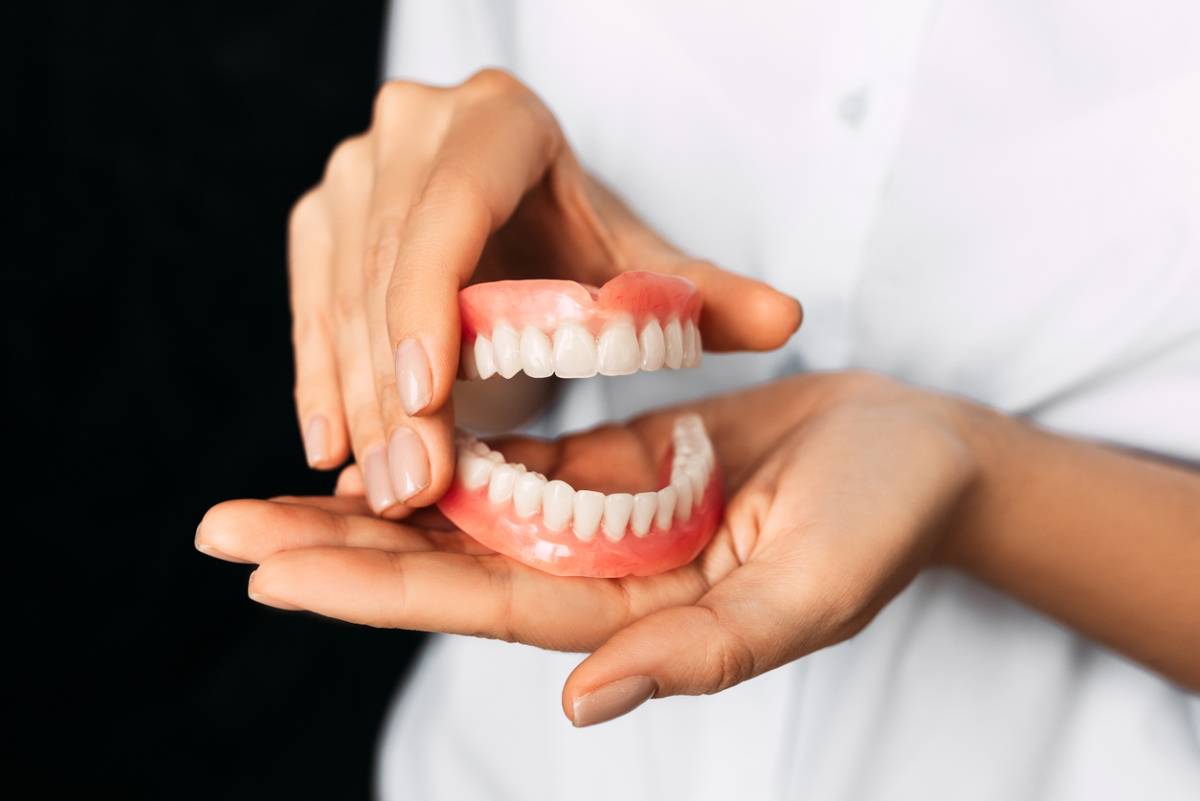Dentures replace natural teeth, enhancing your appearance and boosting your confidence. But can you eat with dentures? In this article, we address this question and give tips on how to make your dentures more comfortable.
Can You Eat With Dentures?
You can eat with dentures. In fact, dentures are designed to make eating more comfortable and improve nutrition for individuals who have lost their natural teeth. However, there are some limitations to the types of foods that can be eaten with dentures.
Unfortunately, dentures can not compare to the strength of natural teeth:
- Traditional dentures, which rely on the gums and jawbone for support, can provide approximately 20 to 25 percent of the natural biting force.
- Snap-in, removable dentures supported by dental implants are more secure and stable in the mouth, providing up to 60 percent of the natural biting force.
- Fixed dentures that are permanently attached to dental implants are the strongest solution, with up to 90 percent of the natural biting force.
Tips for Eating with Traditional Dentures
As we mentioned above, traditional dentures are supported by the gums and the bone underneath. As a result, they can slip or shift in the mouth when you chew food, especially if you are not yet used to your appliances. Let us discuss the rules that can help you make the process more comfortable:
- Opt for soft foods that require minimal force for biting or chewing. Examples of such foods include pureed or soft-boiled vegetables, cutlets, eggs, soups, soft-boiled pasta and grains, bread without seeds, smoothies, etc.
- When you first start wearing dentures, begin with the softest and liquid foods (such as smoothies, cottage cheese, and soups) and then gradually add firmer foods to your diet (like bread, cutlets, and pasta).
- Cut your food into small pieces to make chewing easier.
- Avoid sticky foods (for example, toffee) that can pull and dislodge your dentures.
- Chew your food on both sides of your mouth simultaneously to distribute the pressure evenly and prevent dentures from shifting and slipping.
- Sip water or other beverages with your meals to help break down the food in your mouth more easily.
- Avoid hot foods and beverages, as they can irritate your mouth and also damage the plastic parts of your dentures.
- If your dentures tend to slip and rub against your gums, try using a denture adhesive to help the appliances sit securely in place.
Other Tips for Making Your Dentures Feel More Comfortable
Discomfort when eating can be caused by your dentures rubbing against the sore or irritated spots in your mouth. To heal and prevent sores from denture rubbing, we recommend following these tips:
- Establish a sufficient oral hygiene routine. Clean your mouth twice a day and rinse your mouth after meals. Bacteria that linger in the mouth if your oral hygiene is insufficient will worsen the irritation and sores.
- Ensure that your dentures are clean before placing them in your mouth. Brush your dentures in the evening according to the instructions provided by your dentist, and soak them overnight. Also, rinse your dentures after every meal.
- Rinse your mouth with a special anti-inflammatory solution (for example, a chamomile solution) to promote healing of the sores and irritation.
- Drink plenty of water throughout the day to prevent mouth dryness, which often happens with wearing dentures.
Additionally, discomfort, rubbing, and slipping of dentures can occur while eating if their size is not suitable for you. Since your jawbone shrinks over time when you are missing your natural teeth, the size and fit of your dentures may need to be adjusted. Consult your dentist if your dentures are causing you discomfort.
Get High-Quality Dentures at Tropic Dental Care
Do not hesitate to schedule an appointment with an experienced dentist at Tropic Dental Care to receive custom-made, comfortable dentures. We are looking forward to your visit.



